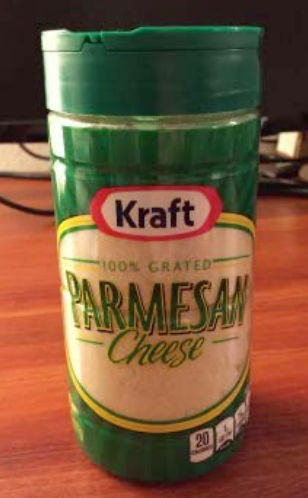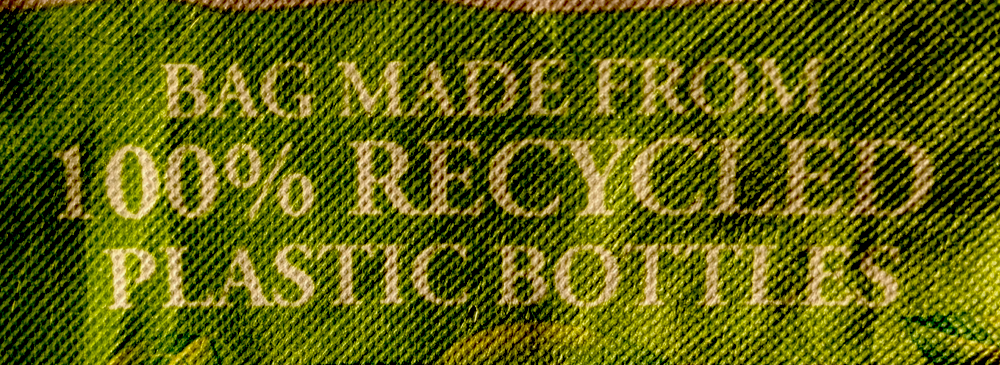"Made from 100% VERBed X Y"?
« previous post | next post »
 As discussed in "this post" from 9/5/2017, the label "100% grated Parmesan cheese" means only that the product's Parmesan cheese is 100% grated, or maybe that the cheese in it is 100% Parmesan — never mind the cellulose powder that's also in the mix.
As discussed in "this post" from 9/5/2017, the label "100% grated Parmesan cheese" means only that the product's Parmesan cheese is 100% grated, or maybe that the cheese in it is 100% Parmesan — never mind the cellulose powder that's also in the mix.
So I wondered about the grocery bags that are labeled
BAG MADE FROM
100% RECYCLED
PLASTIC BOTTLES
Are 100% of the bag's ingredients recycled plastic bottles? Or are the bottles in its ingredients chain 100% recycled, never mind the rest of the mix?
Probably the former, but who knows…

Y said,
December 29, 2023 @ 4:16 pm
"Bag 100% made from recycled plastic bottles" is unambiguous (I think), but it comes off as bad English.
Max said,
December 29, 2023 @ 5:15 pm
But is a recycled plastic bottle made from recycled plastic or can it be 100% new plastic? (Recycled plastic) bottles or recycled (plastic bottles)?
K said,
December 29, 2023 @ 5:26 pm
The Kraft food product may well be legally 100% comprised of Parmesan cheese. IIUC different foods and "dietary supplements" have different qualifications for what ”100%" and "0%" mean. For example, "0% alcohol" means "<0.5% alcohol" in many jurisdictions (including the US), and "0.0% alcohol" can mean something like "≤0.03% alcohol" (in Germany, apparently). OTOH "100% maple syrup" is apparently taken rather seriously (especially by Canada). In the case of Parmesan cheese, I'd guess it might mean "≥99.5% Parmesan cheese."
I wouldn't be surprised if claims like "100% recycled plastic bottles" are completely unregulated, regardless of wording. Though in principle it should be covered by consumer protection (false advertising) and thus be subject to "reasonable interpretation." Which might be something like "≥99.5% comprised of recycled plastic bottles."
Tom said,
December 29, 2023 @ 6:05 pm
Such ambiguity can be dangerous. There was a viral story earlier this year of someone seriously injured when they underwent an MRI scan while making use of a butt plug type sex toy. The toy was apparently made from “100% body-safe silicone” – and a steel core.
DaveK said,
December 29, 2023 @ 7:31 pm
In K’s example of “100% Parmesan cheese” does that mean the the product contains absolutely nothing but Parmesan cheese or does it mean that all the cheese in the canister is Parmesan (unadulterated by Romano or anything else) and it may have the usual chemicals added to retard spoilage, decrease clumping, etc?
Jenny Chu said,
December 29, 2023 @ 8:30 pm
I sometimes teach workshops on communicating about sustainability. One of the most important lessons is to avoid "100%" claims on your packaging and advertising – 100% sustainably-sourced raw material, 100% post-consumer recycled plastic, etc. There will always be someone ready to challenge your claim on a technicality.
StephenGoranson said,
December 29, 2023 @ 9:51 pm
Influential in purity history:
"Ivory Soap is 99 and 44/100% pure."
J Greely said,
December 29, 2023 @ 11:38 pm
Found in a Domino's Pizza ad a few years ago: "Two layers of pepperoni sandwiched between provolone, Parmesan-Asiago and cheese made with 100% real mozzarella then sprinkled with oregano."
Annie Gottlieb said,
December 30, 2023 @ 12:17 am
When we began to be able to deposit checks with our phones, Chase Bank instructed us to endorse them, "For electronic deposit only at Chase." Then some grammar nerd must have tapped them on the shoulder, because they changed it to "For electronic deposit at Chase only."
Cervantes said,
December 30, 2023 @ 8:28 am
This is an actual food label:
100% VEGETABLE JUICE
with added ingredients
I leave you to conclude what possibilities that encompasses.
Seth said,
December 30, 2023 @ 9:12 am
@Tom – I'm a bit skeptical of that story. Snopes is uncertain, but seems to lean to it being dubious.
https://www.snopes.com/fact-check/mri-butt-plug-injuries/
I believe patients are checked with a metal detector before undergoing MRI scans, because there's just too much metal that people can forget about, from hair pins to surgical implants, to rely on self-report alone.
Stephen Goranson said,
December 30, 2023 @ 10:04 am
"Plant based" food might mean
100% without meat (and eggs and dairy)
100% plant, or
mostly plant.
'
Robert Coren said,
December 30, 2023 @ 10:41 am
@StephenGoranson: I have always wondered about Ivory soap: 99 and 44/100ths percent pure what?
J.W. Brewer said,
December 30, 2023 @ 12:59 pm
RELEVANT LEGAL FOLLOW-UP: Some years after the initial thread and I think after some more go-rounds in the district court, Judge Feinerman's views on the "100%" labeling issue before him were finally subjected to appellate review, and the relevant appellate court reversed him (as to points in his decisions that they thought were properly before them) in this December 2020 opinion: https://media.ca7.uscourts.gov/cgi-bin/rssExec.pl?Submit=Display&Path=Y2020/D12-07/C:19-2581:J:Hamilton:aut:T:fnOp:N:2625015:S:0
I have not gone back and re-read that appellate decision since shortly after it came out, but my view at the time FWIW was that I found it less persuasive and thought that Judge Feinerman had had the better view. In what I hope was an unrelated development, Judge Feinerman subsequently chose to resign from the federal bench and return to private practice at the end of 2022, somewhat in advance of conventional retirement age for federal judges.
Stephen Goranson said,
December 30, 2023 @ 1:09 pm
@RobertCoren
I guess pure as to whatever counts as soap ingredients.
To be silly, what if the rest was dangerously impure?
Bloix said,
December 31, 2023 @ 9:54 am
As a lawyer who, before retirement, dabbled in the world of consumer products, it was my view (supported by law) that a representation on packaging is in the nature of a contract warranty. That is, it is a representation of fact on which a prospective purchaser is intended and has a right to rely when making the decision to enter into to a contract with the seller. Further, the wording of the representation is chosen by solely the manufacturer, and therefore any ambiguity must be interpreted in the manner most favorable to the counter-party to the contract, the purchaser (this is the doctrine of contra proferentum). Next, there is a considerable body of law recognizing that a representation made in large letters on the front of a package is intended to attract attention and to persuade the shopper to buy – that is, to enter into a contract with the seller – while small-print warnings and information on the back or side of the package are not intended to be studied by consumers while standing in the aisle, but to provide additional information before use at home, after the contract has been consummated. Therefore, the large-print representation on a package front must govern any contradiction or ambiguity between statements on the front and back, when the information known to the shopper at the point of making the decision to buy is at issue.
Lastly, it really does shock me to see judges invent facts without evidence, such as that consumers "must have known" based on aisle placement – regardless of whether such consumers did know – that the container contained non-cheese ingredients like preservatives, even though the package loudly and proudly announced "100% grated Parmesan cheese."
As for the particular statement under discussion in the post – "made from 100% recycled plastic bottles"- IMHO that there is a clear difference between "made FROM" and "made WITH." A representation that a product is "made from" something, with or with the "100%," can mean only that there are no other ingredients, while "made with" means that there may be other ingredients as well.
Robert Coren said,
December 31, 2023 @ 10:16 am
@Bloix: Interestingly, that distinction between "made with" and "made from" is explained with considerable specificity in Dorothy Sayers' Murder Must Advertise.
Philip Taylor said,
December 31, 2023 @ 10:25 am
Bloix — regarding your last paragraph : although I can see that "made WITH" allows more flexibility than "made FROM" (which should allow none), is not the point at issue whether "100% recycled plastic bottles" must be parsed as "(100%) (recycled plastic bottles)" or "(100% recycled) (plastic bottles)" ? If the former obtains, then the contents must be made solely from recycled plastic bottles and nothing else; if the latter obtains, then all plastic bottles used in the manufacter must be recycled but other ingredients may be present — cf. L'Antidote Petillant Jus Et Plantes "made from the juice of Gamay red wine grapes" but "combined with fifteen herbs grown in the vineyard along with apple, ginger and lemon".
Jim said,
January 3, 2024 @ 3:28 pm
I'm reminded of the strip clubs that advertise "100 beautiful girls and 3 ugly ones", one of the best bits of cover-your-ass reasonably honest advertising out there.
"Cover your ass" + strip clubs, ha ha ha